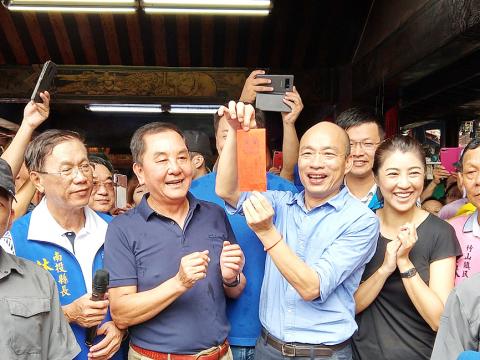Chinese Nationalist Party (KMT) presidential candidate and Kaohsiung Mayor Han Kuo-yu (韓國瑜) yesterday accused President Tsai Ing-wen’s (蔡英文) administration of causing “unspeakable suffering” to Taiwanese.
There must be peaceful exchanges across the Taiwan Strait to facilitate the flow of people and goods, which would make Taiwan richer, Han said.
He called on his supporters to vote the Democratic Progressive Party (DPP) out of the Presidential Office and the Legislative Yuan in next year’s elections.

Photo: Liu Pin-chuan, Taipei Times
Han made the remarks in a meeting at the Nantou County Council.
While Taiwan’s exports are subjected to a 10 percent tariff, the nation’s main competitor, South Korea, enjoys preferential taxes on 70 percent of its exports via a free-trade arrangement it negotiated with the UK and other nations, Han said, without elaborating.
“Our products are sold at higher prices and we lost Chinese tourists not traveling in group tours,” he said. “Without people coming in or goods going out, the economy cannot grow.”
“The elite residents of Nantou must unite for their children’s sake and vote the DPP out of office to allow Taiwan to have a future,” he said.
In response to requests for comment on remarks by former KMT legislator Chen Hung-chang (陳宏昌) that Han spent his time as a lawmaker “boozing, partying and womanizing,” Han said he did smoke, drink and play mahjong at the legislature.
“However, that was Han Kuo-yu from 10 or 20 years ago, not the man I am now,” Han said. “Chen was remembering the old Han and if he wants to I can prove it to him that I have changed.”
Chen, a KMT member and head of New Taipei City’s Younglian Temple (湧蓮寺), made the comment during Tsai’s visit to his temple earlier yesterday.
KMT New Taipei City chapter head Lee Chien-lung (李乾龍) said that Chen’s remarks were inappropriate and a disciplinary meeting would convene today to discuss possible disciplinary action.
“While the party expects Chen to greet the guests to his temple, it was inappropriate for a member of the party’s Central Supervisory Committee to criticize Han and elevate Tsai,” Lee said.
Additional reporting by Chen Hsin-yu

Alain Robert, known as the "French Spider-Man," praised Alex Honnold as exceptionally well-prepared after the US climber completed a free solo ascent of Taipei 101 yesterday. Robert said Honnold's ascent of the 508m-tall skyscraper in just more than one-and-a-half hours without using safety ropes or equipment was a remarkable achievement. "This is my life," he said in an interview conducted in French, adding that he liked the feeling of being "on the edge of danger." The 63-year-old Frenchman climbed Taipei 101 using ropes in December 2004, taking about four hours to reach the top. On a one-to-10 scale of difficulty, Robert said Taipei 101

Nipah virus infection is to be officially listed as a category 5 notifiable infectious disease in Taiwan in March, while clinical treatment guidelines are being formulated, the Centers for Disease Control (CDC) said yesterday. With Nipah infections being reported in other countries and considering its relatively high fatality rate, the centers on Jan. 16 announced that it would be listed as a notifiable infectious disease to bolster the nation’s systematic early warning system and increase public awareness, the CDC said. Bangladesh reported four fatal cases last year in separate districts, with three linked to raw date palm sap consumption, CDC Epidemic Intelligence

Two Taiwanese prosecutors were questioned by Chinese security personnel at their hotel during a trip to China’s Henan Province this month, the Mainland Affairs Council (MAC) said yesterday. The officers had personal information on the prosecutors, including “when they were assigned to their posts, their work locations and job titles,” MAC Deputy Minister and spokesman Liang Wen-chieh (梁文傑) said. On top of asking about their agencies and positions, the officers also questioned the prosecutors about the Cross-Strait Joint Crime-Fighting and Judicial Mutual Assistance Agreement, a pact that serves as the framework for Taiwan-China cooperation on combating crime and providing judicial assistance, Liang

US climber Alex Honnold left Taiwan this morning a day after completing a free-solo ascent of Taipei 101, a feat that drew cheers from onlookers and gained widespread international attention. Honnold yesterday scaled the 101-story skyscraper without a rope or safety harness. The climb — the highest urban free-solo ascent ever attempted — took just more than 90 minutes and was streamed live on Netflix. It was covered by major international news outlets including CNN, the New York Times, the Guardian and the Wall Street Journal. As Honnold prepared to leave Taiwan today, he attracted a crowd when he and his wife, Sanni,